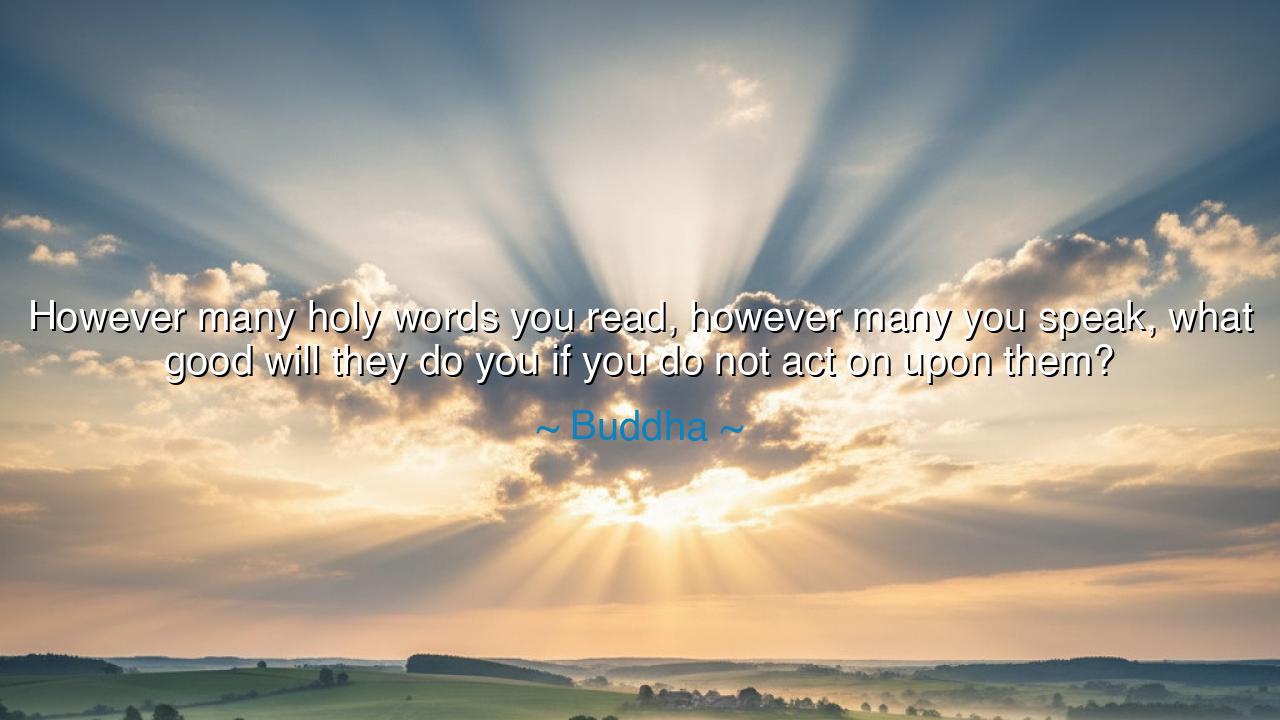
However many holy words you read, however many you speak, what
However many holy words you read, however many you speak, what good will they do you if you do not act on upon them?






“However many holy words you read, however many you speak, what good will they do you if you do not act upon them?” spoke the Buddha, the Enlightened One, whose wisdom shone not in abstraction but in the living practice of truth. In this teaching, simple yet eternal, the Buddha draws a line between the knowledge of the mind and the awakening of the heart. He warns that sacred words, though luminous as pearls, become empty shells when not embodied in action. To know the path is one thing; to walk it is another. True understanding, he teaches, is not proven by eloquence, but by the quiet, steadfast transformation of one’s life.
The origin of this saying lies in the Buddha’s early discourses, particularly in the Dhammapada, a collection of his teachings recorded by his disciples after his enlightenment. Surrounded by seekers and scholars who often debated scripture and philosophy, the Buddha saw how easily the mind can become entangled in words — how many strive to master sacred texts yet fail to master themselves. His message was both compassionate and sharp: wisdom without action is illusion. Just as a traveler who studies maps but never takes a step will never reach his destination, so too does the one who recites holy words without living them remain bound in ignorance.
“What good will they do you?” — this question pierces the heart like an arrow of truth. For the Buddha knew that humanity’s greatest weakness is not ignorance, but inaction. We know what is right, yet we hesitate; we speak of compassion, yet we harbor resentment; we admire virtue, yet cling to desire. Words alone cannot dissolve suffering — only practice can. The teachings of every sage are like a lamp, but one must light it with the oil of effort. To read of love is easy; to live with love in a world of anger is divine labor. To study patience is simple; to remain patient amid insult is mastery. The scriptures are mirrors — but it is our actions that reveal whether we truly see ourselves in them.
History bears witness to this eternal truth. Consider King Ashoka, the mighty ruler of India who once waged wars of conquest, spreading death across nations. After witnessing the devastation of the Kalinga War, his heart broke open. Though he had studied the teachings of the Buddha before, their meaning had never entered his soul. But in that moment of anguish, he acted upon them. He renounced violence, embraced compassion, and became a ruler devoted to peace and justice. His transformation illuminated a continent. The holy words he had once merely heard became living truth when he chose to walk them. In this, he became not just a student of the Buddha, but a reflection of the Buddha’s light.
The Buddha’s wisdom extends beyond religion — it touches the essence of human integrity. To speak of justice while living unjustly is to betray truth. To preach kindness while practicing cruelty is to darken the spirit. The Buddha reminds us that every word of wisdom demands a response — not applause, not memorization, but imitation. The scriptures of all faiths are rivers leading toward the ocean of liberation, but only those who step into the current, who live by compassion, mindfulness, and humility, will reach the shore. Knowledge without virtue is like a tree that blossoms but bears no fruit; it may please the eye, but it nourishes no one.
And yet, the Buddha’s teaching is not meant to condemn, but to awaken. He does not scorn those who read the holy words; he invites them to let those words take root in the fertile soil of the heart. Every verse of truth is a seed — but unless it is watered by action, it will wither. Meditation, kindness, honesty, restraint, generosity — these are the acts that transform theory into awakening. The one who practices even a single teaching with sincerity walks further on the path than the one who speaks a thousand without change. For enlightenment is not achieved through words, but through being.
So, dear listener, what lesson shall we draw from the wisdom of the Blessed One? It is this: live what you learn. Let your faith be seen not in your speech, but in your steps. When you read sacred words, do not let them end in the ear — let them flow through your hands, your thoughts, your deeds. If you speak of love, then forgive. If you speak of peace, then cease your harm. If you admire truth, then live honestly, even when it costs you comfort. This is the path of the awakened — not to collect teachings like treasures, but to become the teaching itself.
For as the Buddha taught, wisdom is not in the reading of holy words, but in the living of them. Let every truth you know shape your heart, and every heart you touch become a scripture of its own. In this way, your life becomes a sacred verse written not in ink, but in compassion — a poem of light read by all who behold you.






AAdministratorAdministrator
Welcome, honored guests. Please leave a comment, we will respond soon